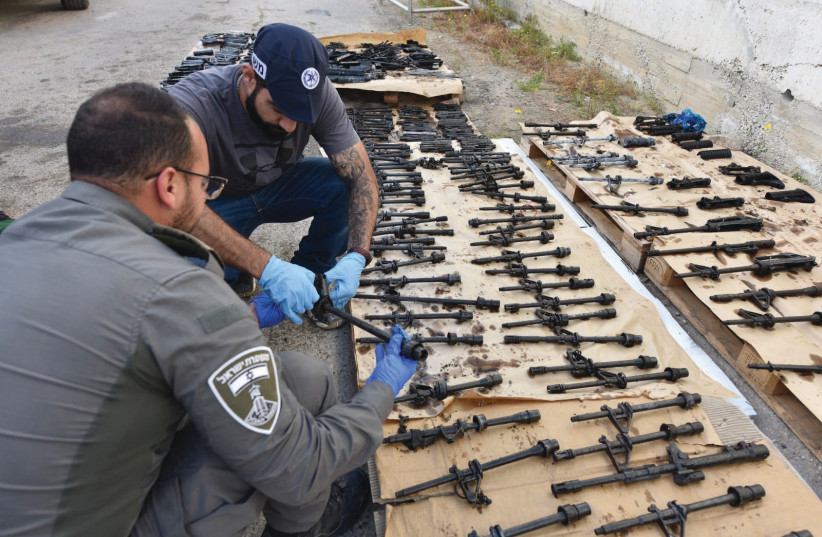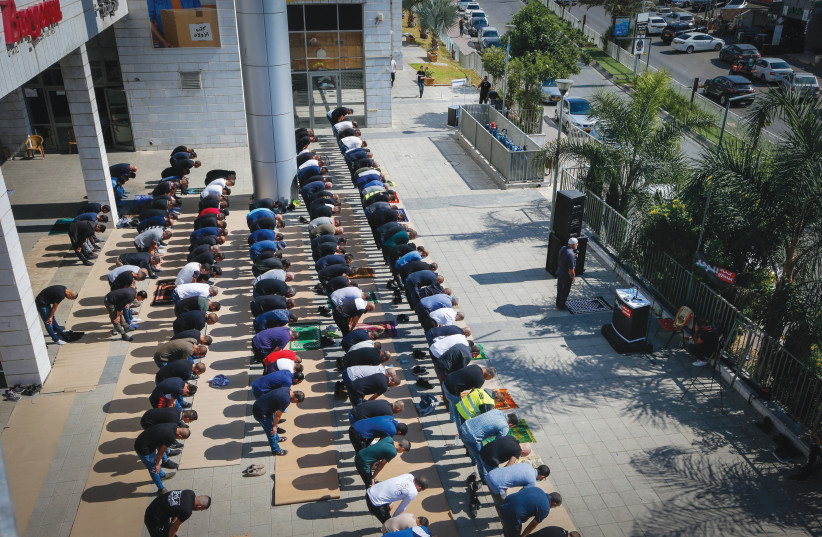What effect has Operation Safe Route, which started eight months ago and the joint efforts of nine governmental offices, had on violence in Arab communities?

The “Maslul Batuah”(Safe Route) operation, which set out to stem the tide of crime in Arab communities, spanning joint efforts of nine governmental offices, has recorded impressive strides since its initiation eight months ago.
Last year, the violence in the sector exploded to a dramatic peak of 130 murders – on average, a person was murdered in Arab society every three days. Weapons seemed to flow freely in Arab towns, in what to locals felt like a lawless land, but since the Safe Route crackdown, the police say they have turned the tides and restored law and order.
But are the operation’s effects really felt in Arab communities as the police claim?
In the enforcement of the operation, mostly in the North, 3,871 suspects were arrested, thousands of weapons were seized, and 1,153 indictments were filed for weapons offenses across Israel.
Since the beginning of the year, the police have increased their activity against weapons crimes in Arab communities. In the past half-year (January-June 2022), the police across the country arrested 3,871 suspects for crimes of armed robbery and shooting, and about 92% of the suspects arrested were from the Arab community.

Also, in the first half of 2022, at the end of the police investigations, 1,153 indictments were filed against those accused of shooting and assault offenses all over the country. About 88% of the indictments filed for the offenses of shooting and possession, trafficking and use of weapons were filed against defendants from Arab society.
In addition, 31 illegal buildings were destroyed, a total of NIS 10 million was confiscated, and, as part of the fight against road crime, over 8,000 traffic fines with a total value of over NIS 5m. were distributed.
“Since the beginning of Operation Safe Route, the Israel Police has recorded significant achievements in dealing with crime and violence in Arab communities, in dealings with crimes of extortion through threats and seizures of firearms held against the law,” said Ch.-Supt. Leon Hirsch, head of the Operational Coordination Section in the Police Intelligence Division.
“The Israel Police has also recorded significant achievements in filing indictments for these crimes which constitute a significant nuisance to the public in Arab communities. Since the operation began, there has been a much higher demand for police services, and we see this in the responses we receive from the residents,” he added.
Seizing weapons, arresting criminals
During this period in 2022, tens of thousands of weapons, explosives, ammunition, grenades and other illegal items were seized in towns of Arab communities, including 770 handguns, and more than 100 submachine guns and 350 guns of different types, thousands of items of ammunition, as well as hundreds of grenades, weapon parts and explosives – a significant increase when compared to the same time period in 2021.
The operation has been carried out so far in 19 localities, including Haifa, Umm el-Fahm, Nazareth and Rahat.After almost half of 2022 has passed, data shows that the extensive operation launched by the police to eradicate violence resulted in success – at least partially: until June 5, 31 people in the Arab community were murdered in Israel, including four women, compared to 50 murdered in the first half of 2021 (up to May 27 to be exact).
In total, according to police data, since the beginning of the year, 42 people have been murdered throughout the country, of which, as mentioned, 31 were from Arab society. So far the police have solved only 12 murder cases in the Arab sector this year. The police attribute this decrease in the number of murders in the sector to the operation.
Murder on the rise
Despite the effort police have put forward, some remain skeptical about the actual effect they have, as murder cases in Arab society continue to rise, hitting 55 murders up until July, according to data from independent NGOs.
WHILE POLICE actions are at the forefront of the operation, it is much larger in scope when looked at from a broader lens. Efforts of the Finance Ministry and income tax officials, for example, set out to combat money laundering and illegal loans, which in turn entangle many civilians.
“Many Arab towns in the North don’t even have a bank or any other means of legally handling financial affairs. Left out of options, they turn to organized criminal syndicates,” Ola Najami-Yousef, vice president of the Abraham Initiative NGO, which tracks crime in Arab communities, told the Magazine in an interview.
The issue, she explained, is much larger than a simple lack of policing. The Arab communities have long faced neglect from all governmental offices, from finance to education. Residents are often left to their own devices, something that leaves a large vacuum for criminals to fill.
Arabs were viewed as a security threat themselves
Before Safe Route was initiated, Arabs were viewed as a “security threat themselves. Even though a lot of these issues were well known to the government, nothing was done, until now.
“The way Arab society is viewed and discussed has changed; we’re no longer social pariahs, and a wide range of efforts is now being undertaken to give Arab communities what they rightfully deserve as Israeli citizens,” she said.
THE PROBLEM with crime in the communities often stemmed from this larger perspective that painted Arabs as a collective threat.
Even if a plain citizen got entangled with criminal elements on account of a lack of services, he had no one to turn to when things turned sour, a situation that not only left an opening for crime on its own but also severely hurt the communities’ trust in the police, further increasing the reign of criminals.
In towns like Nazareth, where Najami-Yousef lives, you could hardly notice police presence, and towns like Jisr e-Zarka didn’t even have a functional police station, even though the building for it existed.
Now, police are making efforts to increase their presence, understanding that the lack of trust from locals severely impacts how well they could combat crime effectively.
The change is certainly being felt.
Jasser’s police station, which had been vacant until now, is fully staffed, and towns like Rahat and Nazareth are seeing more patrol cars on the streets. Najami-Yousef, a resident of Nazareth herself, even stated that “you could even hear less gunfire in Nazareth these days.”
To further the bond with the community, the Abraham Initiative has organized meetings between teens and police officers from local stations. The change, Najami-Yousef said, is slowly starting to take effect.
But when looking at the still high murder rate which claimed the life of 11 Arabs in the last month, one could question the effectiveness of this change.
“These things take time,” Najami-Yousef explained. “It may take up to five years until we would see a practical change in murders.”
Najami-Yousef even theorized that the latest chain of murders could be a direct response to police efforts, with criminal organizations feeling the pressure and, in turn, attempting to clean house.
Police officials claimed, on the other hand, that the operation has attained significant achievements, and that the decrease in the number of murders is felt “everywhere” in the Arab sector.
One of the reasons for this, according to them, is that budgets are now being diverted to combating violence in the sector, making it possible to strengthen the forces stationed in the Arab communities and also recruit Arabs directly to the police.
“In the last five years, 800 Muslims have been recruited to the Israel Police. Today the police can react quickly when cases of violence occur,” a police official said.
“Along with the continuation of enforcement and its deepening, in order to deal with the phenomenon and completely deter it, a multisystemic treatment and a deep-rooted change beyond police enforcement are needed,” said Ch.-Supt. Hirsch. “The Israel Police will continue the determined fight in Arab society and everywhere else, all in order to maintain public peace and security.” ■
As reported by The Jerusalem Post
